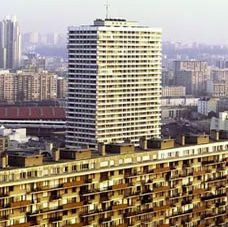PARIS -- "If I could get my hands on Sarkozy, I'd kill him." Thus begins author David Rieff's article in the New York Times Magazine last month on Nicolas Sarkozy's relation to the French "banlieues." Needless to say, it is not David Rieff himself, a fellow of the World Policy Institute in New York, who is proffering the threat. Rather he is quoting one "Mamadou", a young resident of the Les Bousquets housing project outside Paris. Evidently having succeeded in making an impression on the American visitor, Mamadou continued, "Then I'd go to prison. And when I got out, I'd be a hero." In fact, Mamadou might even be able to go to prison and be a hero right now, since under the French Penal Code, the making of death threats is itself a crime. Rieff goes on to ask a second young man, named "Ahmad", if he too "felt the same way." "I wouldn't kill him, no," Ahmad is supposed to have responded, "But I hate him. We all hate him." All? Anyone reading Rieff's account or indeed virtually any of the English-language reports on the tensions in the poor, dilapidated suburbs on the outskirts of France's major urban centers would indeed be led to believe that "all" the residents of the French banlieues hate Nicolas Sarkozy. But the results of last Sunday's election tell a quite different story. Rieff points to Montfermeil, where Les Bousquets is located, as one of the typical "hard-up towns" with large immigrant populations where hostility to France in general and Sarkozy in particular is supposed to be the norm. He could hardly have chosen a worse example. As so happens, Montfermeil is a stronghold of Sarkozy's Union for a Popular Movement (UMP) party and Sarkozy carried Montfermeil on Sunday with a comfortable 52.2 percent of the vote as against 47.8 percent his Socialist rival Ségolène Royal. But let us allow that Montfermeil is not, after all, quite so typical of conditions in the banlieues as Rieff supposes. What, then, about Clichy-sous-Bois, the other Parisian suburb that he cites? Clichy-sous-Bois earned a certain notoriety in fall 2005 as the flash point from which riots would spread throughout the department of Seine-Saint-Denis at the east of Paris and then all across urban France. The rioting began after two local youngsters, Bouna Traore and Ziad Benna, were found electrocuted in a power station in which they had been hiding from the police. Rieff unquestioningly repeats the commonly made allegation that police "chased" the two boys into the power station. A third youngster who went with them, however, has reported that they in fact took off of their own accord when they saw the police coming. (See here from the French weekly L'Express.)
Nicolas Sarkozy: Scourge of the Banlieues?

